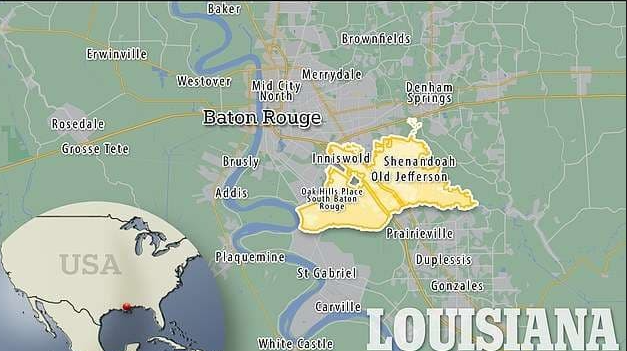
Wealthy white Baton Rouge residents have won a decade-long court battle to split from poorer neighborhoods and form their own city with plans for better schools and less crime.
The Louisiana Supreme Court ruled on Friday that the new City of St George could move forward with incorporation, splitting off from the rest of Baton Rouge.
St George will have 86,000 residents across a 60-square-mile area in the southeast of East Baton Rouge Parish and will have its own Mayor and city council.
Supporters of the new city say that the existing city-parish government is poorly run, with high crime rates and bad schools.
Plans for St George started nearly 15 years ago when residents decided they would like to start their own school district.
Their plans then grew more ambitious and in 2015 they drew up a proposal to create their own city.
The proposal didn’t get enough votes and the movement ground to a halt until 2019, when a second ballot to incorporate St George passed, with 54 percent of residents voting in favor of separation.
A lengthy court battle followed, with Mayor-President Sharon Weston Broome and Mayor Pro Tem Lamont Cole suing St. George organizers soon after the election.
They argued that St George would siphon over $48 million in annual tax revenue from the city-parish government with serious knock-on effects for local services and staff.
They claimed that the loss in revenue would mean services would have to be cut and employees laid off and that St George’s proposed internal budget was inaccurate and that they would not be able to be self-sufficient.
Lower courts in Louisiana supported Baton Rouge’s arguments, and shot down the proposed new city.
{snip}
Critics of the St. George proposal argue that it would create a poor, black, and urban Baton Rouge and a wealthy, white, and suburban St. George.
Posting on Facebook, resident Sarah Stelly wrote: ‘St George reeks of class division, it’s quickly becoming the new worst type of bigotry.’
Another resident, Paul Brady, wrote: ‘The segregationist won. I’m no longer a citizen of Baton Rouge. I now live in the white enclave of St George.’
Leader of an anti-St George campaign group, M.E. Cormier, told the New York Times: ‘There is no basis in fact that the existence of St. George is positive or will bring positivity or have a positive impact on any areas of the cities or the parish.
‘The detanglement, logistically speaking, is going to be an absolute nightmare.’
But Andrew Murrell, a leader of the St George project, told the paper: ‘This is the culmination of citizens exercising their constitutional rights.
‘Now we begin the process of delivering on our promises of a better city.’
{snip}
A 2014 study by the Baton Rouge Area Chamber found that the effects of the partition would be economically devastating for the remainder of Baton Rouge, immediately creating a $53 million budget shortfall.
The study also raised concerns as to whether the remaining portions of Baton Rouge, Louisiana’s state capital, would be able to support public services despite the loss of tax revenue.
{snip}
According to figures compiled by the Baton Rouge Area Chamber, the new town would have a majority white population, as opposed to Baton Rouge which has a black majority and the number of people receiving food stamps would also be more than halved.
* Original Article:
https://www.dailymail.co.uk/news/article-13362499/louisiana-st-george-supreme-court-ruling.html